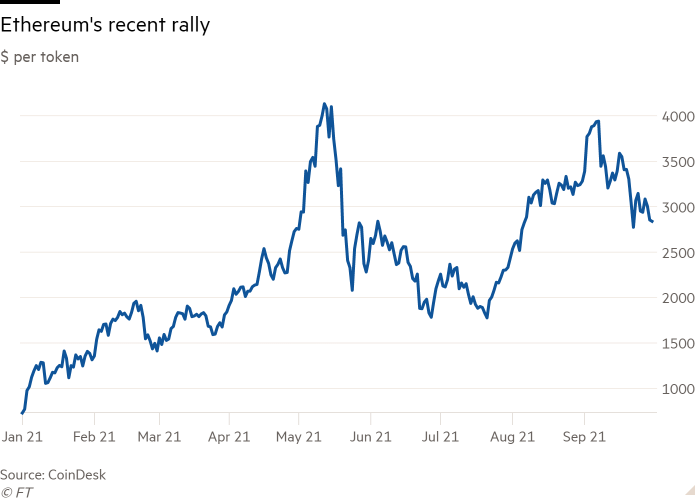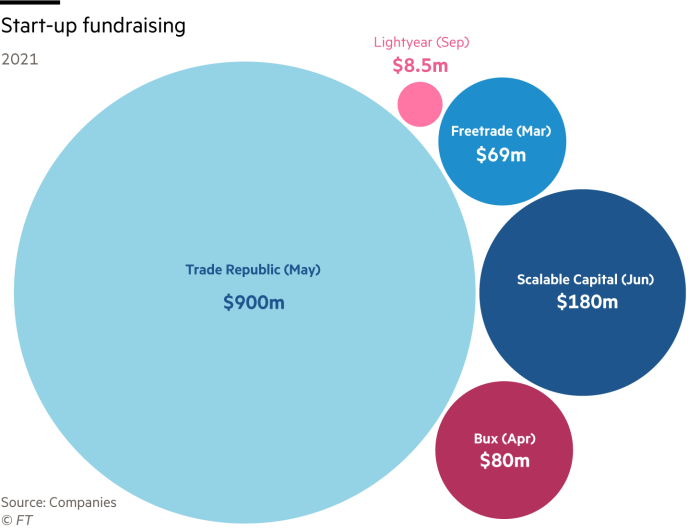Nothing ethereal about ethereum | Financial Times

Newsletter: #techFT
The latest news and comment on the most pressing issues in the technology sector. Delivered every weekday.
This article is an on-site version of our #techFT newsletter. Sign up here to get the complete newsletter sent straight to your inbox every weekday
The ethereum blockchain has come to prominence over the past year, with its underpinning of the non-fungible token (NFT) craze and of the creation of decentralised finance projects (DeFi). So could ethereum be the future of the internet? asks Richard Waters.
It could become the platform of choice for what has become known as Web 3.0, where a series of decentralised apps could one day challenge Big Tech’s offerings. “Sixty to 70 per cent of the industry runs on ethereum. It’s very sticky,” says Sandeep Nailwal, co-founder of Polygon, one of a growing number of companies that operate on top of ethereum.
As a result, the price of ethereum’s currency, known as ether or eth, which is used to pay for the computing power needed to run the blockchain, has jumped ninefold. At around $350bn, the outstanding tokens on ethereum are now worth more than 40 per cent as much as all the bitcoin in issue, more than double the proportion of a year ago.

The investment world is still trying to figure out the role ethereum will play, but plenty are prepared to facilitate trading. Joshua Oliver reports Robinhood’s decision not to expand into Europe has created an army of contenders on this continent, led by Germany’s Trade Republic. Several of the apps integrate crypto. German robo adviser Scalable Capital, which has branched out into stock and crypto trading, says crypto is no longer considered “something super freaky” among younger investors.

The Internet of (Five) Things
1. US regulator reviews safety concerns at Blue Origin
The US Federal Aviation Administration says it is looking into safety concerns raised by 21 current and former employees at the space exploration company owned by Jeff Bezos. The employees described a litany of what they claimed were severe cultural failings, including sexual discrimination, overwork and a prioritisation of speed over safety.
2. Zoom and Five9 abandon $14.7bn deal
Zoom Video Communications’ bid to buy the cloud software provider has collapsed only weeks after the US Department of Justice raised national security concerns over the deal and shareholders were advised to vote against the takeover by a powerful proxy group. Lex says it was a good decision to call off buying the lossmaking company.
Daily newsletter

#techFT brings you news, comment and analysis on the big companies, technologies and issues shaping this fastest moving of sectors from specialists based around the world. Click here to get #techFT in your inbox.
3. Quantum leaps into stock markets
The first quantum computer company to pull off a stock market listing made its debut on Wall Street on Friday, marking a milestone for a technology that until recently was thought to be many years from practical use. IonQ’s public listing, raising $635m through a merger with a special purpose acquisition company or Spac, comes as larger amounts of capital have started to pour into quantum companies.
4. SoftBank’s Oyo books Indian IPO
Oyo, the SoftBank-backed hotel platform, has filed for an IPO through which it hopes to raise Rs84bn ($1.1bn), the latest in a flurry of lossmaking Indian start-ups trying to tap the country’s red-hot equity markets. Lex comments that plans to list are unlikely to help rebuild the business.
5. Investor Lasry quits Ozy Media board
The billionaire investor Marc Lasry has stepped down as chair of Ozy Media after only three weeks in the role, deepening the crisis at the digital media company. Ozy has come under fire after a report in The New York Times questioned its audience figures and revealed that one of its founders had impersonated a YouTube executive on a conference call with Goldman Sachs during a fundraising process.
Tech tools — Fairphone 4 5G
Amsterdam-based Fairphone has been extending the life of phones with its modular handsets and its latest sustainable smartphone adds 5G and a new robustness. Engadget likes the metal and glass casing of the Fairphone 4, compared to flimsier plastic predecessors. There is 5G, a 6.3in Full HD+ display, a 25MP selfie camera, while 48MP main and Ultrawide cameras at the rear mean there are few compromises in going green.



